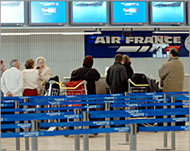US Muslim travellers urged to register
The head of civil rights for the US Department of Homeland Security is urging Muslim air travellers to register with the federal government before flying to reduce the chances they might be stopped at an airport.

The reasons for this may be because their name is on or similar to names on an anti-terrorism watch list.
Registering by completing a form and providing copies of documents will not eliminate the chance that a Muslim traveller will be singled out for closer scrutiny before or after flying, but the department wants to improve its relations with Muslims and Arab-Americans, said Daniel Sutherland.
“We need to listen to their concerns,” he said at a seminar on Homeland Security sponsored by the Knight Centre for Specialised Journalism.
“We need to build a level of commitment and trust that’s unprecedented in our nation’s history, not an ‘us-versus-them’ perception in the community.”
Personal information
One way to do that is by having Muslim and Arab-American travellers complete the form on the web page of the Transportation Security Administration, a division of Homeland Security responsible for protecting mass transit systems including airports.
 |
|
Travellers can divulge details |
The two-page Passenger Identity Verification Form asks for personal information including name, address, birth date, height, weight, eye and hair colour, and requires copies of three of the following documents: passport, visa, birth certificate, naturalisation certificate, voter registration card, government identity card or military identity card.
Once completed, the homeland security department shares the information with airlines, which are able to compare it against security lists that might otherwise red-flag a passenger.
The goal is to distinguish a traveller from people whose names – or close variations thereof – appear on US no-fly lists compiled by intelligence and law enforcement agencies.
It does not remove a name from the list, but seeks to differentiate between a person of interest and someone who has no connection with the person.
‘Insult’
Abdin Aly, an accountant, filled out and mailed in the form after being detained for two hours at New York’s John F Kennedy International Airport.
He had briefly left an airport in Germany to have dinner with a relative during a stopover from a flight home from Egypt.
He said the authorities did not say whether his name appeared on a watch list.
“To do an inspection, there’s nothing wrong with it,” he said.
“But to hold me and my wife for two hours and deny me the right to make a phone call or even use the bathroom is just wrong,” he said.
“It’s an insult. In 35 years here, I have never violated any law.”
Possible alienation
Ironically, not long after the airport incident this summer, Aly said he was mailed an invitation to a fundraiser in Washington from the Republican National Committee, who had identified him as a successful businessman.
|
“There are lots of pressures looking to pull us apart; we’ve got to push past that” |
“You want me to go to this, after you treat me this way?” he asked.
Sutherland acknowledged that checkpoint scrutiny can alienate the very Muslim leaders his department seeks to cultivate as allies.
“There will be peaks and valleys to this relationship,” he said.
“We are a law enforcement agency. There will be times when we arrest, detain and deport Arab-American or Muslim people. But we’ve got to work to build our relationship. There are lots of pressures looking to pull us apart; we’ve got to push past that.”
In April, the Arab-American Anti-Discrimination Committee praised the Transportation Security Administration for directing airlines to “use sound judgment” when evaluating young children whose names are the same as or similar to watch-list names.